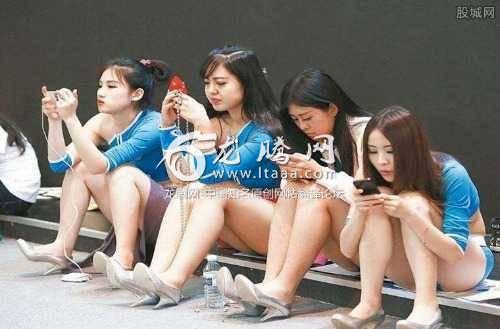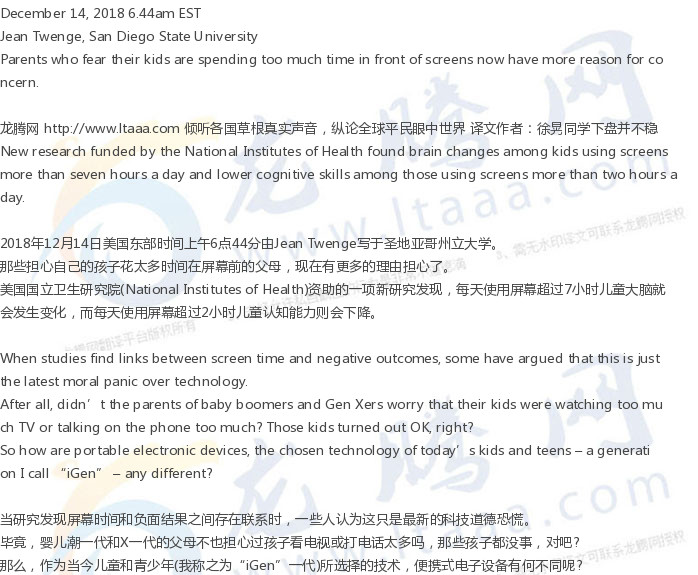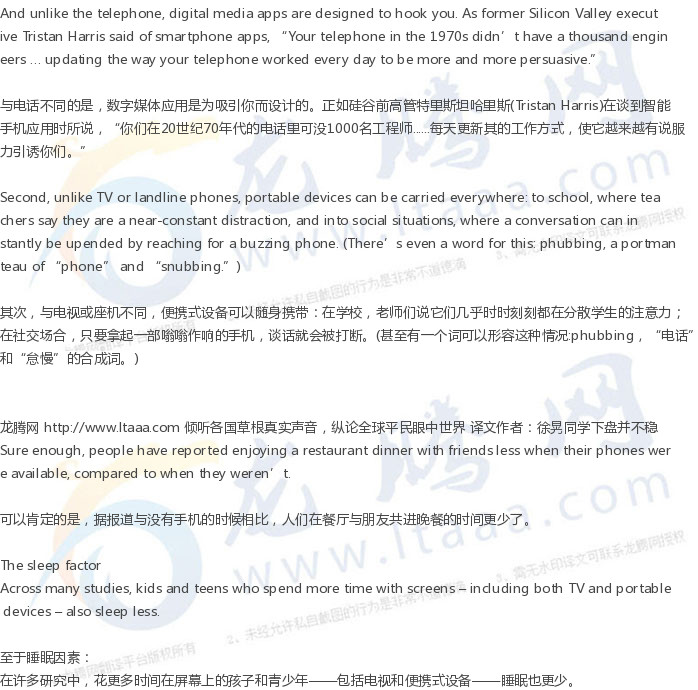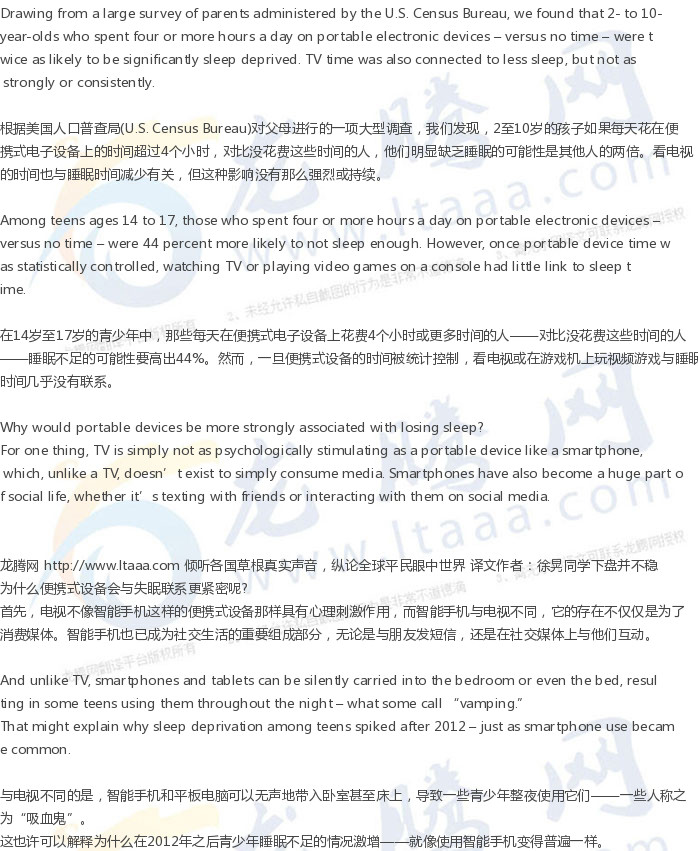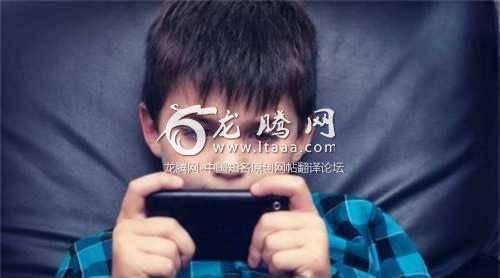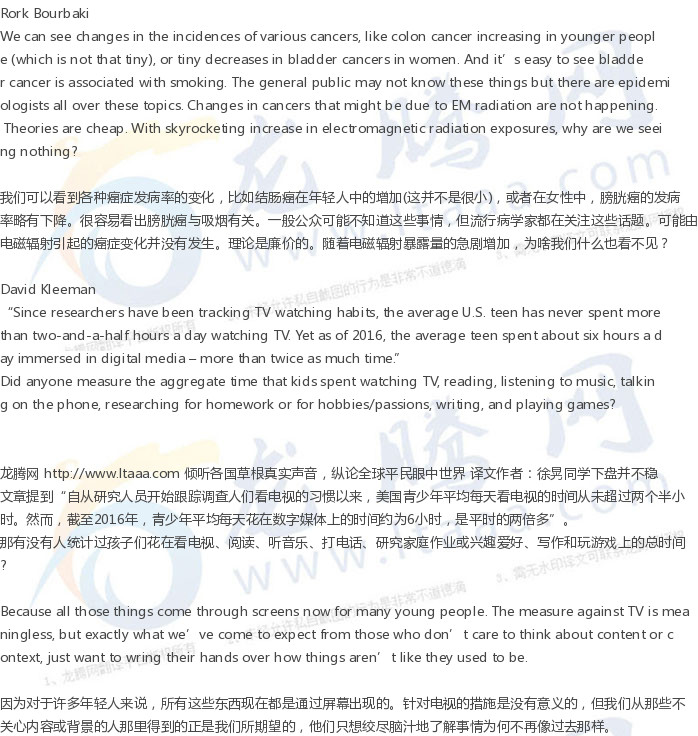担忧孩子过度使用智能手机比以往任何时候都更有道理 [美国媒体]
2012年之后,青少年睡眠不足的情况急剧增加——就像智能手机的使用变得普遍一样。对孩子过度使用智能手机的担忧,比以往任何时候都更有道理。
Sleep deprivation among teens spiked after 2012 – just as smartphone use became common. Worry over kids’ excessive smartphone use is more justified than ever before.
2012年之后,青少年睡眠不足的情况急剧增加——就像智能手机的使用变得普遍一样。对孩子过度使用智能手机的担忧,比以往任何时候都更有道理。
(注:婴儿潮baby boom,指的是在某一时期及特定地区,出生率大幅度提升的现象。历史上有记载的几次婴儿潮,通常是起因于有振奋人心的因素,像是农作物丰收、打赢战争及赢得竞赛等,但也有因为迷信的因素。
“X一代”指出生于20世纪60年代中期至70年代末的一代人,2009年的年龄在30岁出头至44岁之间。这代人在20世纪80年代的经济衰退中长大,又经历21世纪初的互联网泡沫破灭,就在他们成家立业之际,又要面对全球金融危机和经济下滑)
New research I’ve conducted on the relationship between portable device use and sleep provides some answers.
It almost goes without saying that today’s portable devices – including smartphones and tablets – are fundamentally different than the living room television sets and rotary phones of the past.
我对便携式设备使用和睡眠之间的关系所做的新研究,可以提供一些答案。
不用说,今天的便携式设备——包括智能手机和平板电脑——与过去客厅里的电视机和旋转式电话有着根本的不同。
Since researchers have been tracking TV watching habits, the average U.S. teen has never spent more than two-and-a-half hours a day watching TV. Yet as of 2016, the average teen spent about six hours a day immersed in digital media – more than twice as much time.
自研究人员开始跟踪研究人们看电视的习惯以来,美国青少年平均每天看电视时间从未超过两个半小时。然而,截至2016年,青少年平均每天花在数字媒体上的时间约为6小时,是其两倍多。
This large amount of time spent using digital media is enough to crowd out time once spent on other activities, such as interacting with friends face to face, reading or going out.
花费在数字媒体上的大量时间,挤出来就是曾经花在其他活动上的时间,比如与朋友面对面交流、阅读或者外出。
That could be because they spend so much time engaged with their devices that it’s coming at the expense of sleep. But there’s also a physiological reason: The blue light emitted by electronic screens tricks our brains into thinking it’s still daytime, and then we don’t produce enough of the sleep hormone melatonin to fall asleep quickly and get high-quality sleep.
Once again, some might argue that TV is just as bad: After all, it also takes up time and emits blue light.
这可能是因为他们花了太多时间在电子设备上,这是以牺牲睡眠为代价的。但也有生理上的原因:电子屏幕发出的蓝光会欺骗我们的大脑,让我们以为现在还是白天,这样我们就无法产生足够的睡眠荷尔蒙褪黑激素,无法快速入睡,也无法获得高质量的睡眠。
再次强调,有些人可能会认为电视也一样糟糕:毕竟,它也会占用时间并发出蓝光。
(注:褪黑激素Melatonine/MT因为能使皮肤变白而得名,是由脑松果体分泌的激素之一。黑素的分泌具有明显的昼夜节律,白天分泌受抑制,晚上分泌活跃。)
But in a new paper, my co-authors and I decided to parse the two. We studied links between sleep and TV watching as well as links between sleep and portable device use. Then we compared the results.
但在一篇新论文中,我和合着者决定分析这两种情况。我们研究了睡眠和看电视之间的联系,以及睡眠和移动设备使用之间的联系。然后我们比较了结果。
The lesser of two evils?
To be clear, we did find that watching many hours of TV was associated with less sleep, especially among elementary-school age children. Watching over three hours a day of TV is also associated with depression – though more weakly than portable device use.
两害相权取其轻?
需要明确的是,我们确实发现长时间看电视与睡眠不足有关,尤其是在小学生中。每天看电视超过三个小时也与抑郁有关——尽管比使用便携式设备更弱。
So parents were right to worry about kids watching too much TV in the 1970s and 1980s. But their worries might not have been as justified as today’s parents’ concerns about smartphones.
So what is a parent – or anyone who wants to sleep well – to do?
因此,在上世纪七八十年代,父母担心孩子看太多电视是对的。但他们的担心可能不像今天的父母对智能手机的担忧那样合理。
那么,父母或任何想睡个好觉的人该怎么做呢?
First, it’s best for smartphones and tablets to stay out of the bedroom after “lights-out” time. Nor is it a great idea to use the devices within an hour of bedtime, as their blue light influences the brain’s ability to produce melatonin. Finally, as a general rule, two hours a day or less spent on portable devices is a good guideline. These rules apply to parents, too – not only kids.
首先,智能手机和平板电脑最好在“熄灯”后远离卧室。睡前一小时内使用这些设备也不是个好主意,因为它们发出的蓝光会影响大脑产生褪黑激素的能力。最后作为一般规则,每天花两个小时或更少的时间在便携式设备上是一个很好的指导方针。这些规则不仅适用于孩子,同样也适用于父母。
Anne Llewellyn
When I was diagnosed with the Brain Tumor in 11/14, I was playing a lot of candy crush on my Smartphone and laptop. I asked the Oncology Nurse Practitioner if that ha any impact on me getting a tumor. She said we don’t have evidence today that smartphones are a danger, but she said I believe we will soon. Here we are 4 years later. BEWARE.
当我在11月14日被诊断出脑瘤时,我正在我的智能手机和笔记本电脑上玩《糖果粉碎传奇》。我问肿瘤科的执业护士这对我得肿瘤有没有影响。她说,我们目前没有证据表明智能手机是一种危险,但她说相信我们很快就会看到这种危害。转眼到了四年后的今天,各位当心。
(注:Candy Crush 糖果粉碎传奇,这款游戏已经火了一段时间了,国外地铁、公交等公共场合总能看见一些俊男靓女在玩这款游戏,是一款经典的三消游戏)
David Kleeman
Were you holding the phone to your head while you played Candy Crush? If not, it’s very unlikely that your game play had any role in your tumor.
From the National Cancer Institute:
“Hands-free kits reduce the amount of radiofrequency radiation exposure to the head because the antenna, which is the source of energy, is not placed against the head . Exposures decline dramatically when cell phones are used hands-free.”
你玩《糖果粉碎传奇》的时候把手机举到头上了吗?如果不是,你玩的游戏在你的肿瘤中不太可能有任何作用。
以下来自国家癌症研究所:
“免提装置减少了头部受到的射频辐射,因为作为能量来源的天线没有对着头部”。当人们使用免提手机时,接触到的有害物质会急剧减少。
Christopher Anderson
and doc’s supported smoking for years…just saying…It can also be all the WiFi, Smart meters, etc. Some people die because of peanuts or even aspirin. There is that part of the Bell curve that is super susceptible to cancer.
医生多年来一直在说吸烟…只是说…也可能是所有的WiFi,智能电表等等。一些人死于花生甚至阿司匹林。钟形曲线的这一部分人极易患上癌症。
(注:正态分布曲线反映了随机变量的分布规律。理论上的正态分布曲线是一条中间高,两端逐渐下降且完全对称的钟形曲线)
Christopher Anderson
Yet I see this in “adults” under 40 (and actually over 40), who are addicted to “likes” winning games, etc. Many cannot look their boss in the eye and answer questions. Their demeanor is one of embarrassment and low self esteem. I have had one who refused to interview face to face and wanted the interview to be conducted via txt.
然而,我在40岁以下的“成年人”(实际上是40岁以上的人)身上看到了这一点,他们沉迷于“喜欢”在游戏获胜,等等。许多人不能直视老板的眼睛回答问题。他们的行为举止充满尴尬和自卑。我遇到过一个人,他拒绝面对面采访,只希望通过txt进行交流。
Christopher Anderson
Turn off the TV, smart phone, video game, etc. go outside and play. Read a book. Garden. live life.
关掉电视、智能手机、电子游戏等等,到外面去玩吧。读一本书,养养花啦,好好生活。
版权声明
我们致力于传递世界各地老百姓最真实、最直接、最详尽的对中国的看法
【版权与免责声明】如发现内容存在版权问题,烦请提供相关信息发邮件,
我们将及时沟通与处理。本站内容除非来源注明五毛网,否则均为网友转载,涉及言论、版权与本站无关。
本文仅代表作者观点,不代表本站立场。
本文来自网络,如有侵权及时联系本网站。
图文文章RECOMMEND
热门文章HOT NEWS
-
1
Why do most people who have a positive view of China have been to ...
- 2
- 3
- 4
- 5
- 6
- 7
- 8
- 9
- 10
推荐文章HOT NEWS
-
1
Why do most people who have a positive view of China have been to ...
- 2
- 3
- 4
- 5
- 6
- 7
- 8
- 9
- 10
